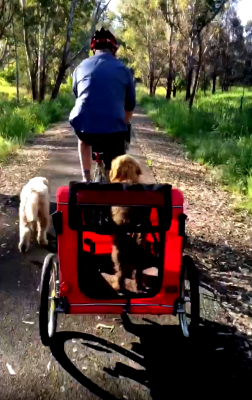
Following our blog about dog parks risks, we thought we should delve more into the critical 16 weeks ‘socialisation period’ for puppies and explore much better options for your puppy.
This crucially important imprinting period is an opportunity to provide your puppy positive encounters with as many and varied sights, sounds, experiences, people, environments, places, and other dogs and animals as you possibly can! With you by his side your puppy will make positive associations and learn to cope confidently and calmly.
This socialisation prepares puppy to be a relaxed, well-adjusted adult under all circumstances, planned or unexpected. An under-socialised dog in an unfamiliar situation may show either overexcitement and be difficult to control, or insecurity and be afraid or aggressive.
This narrow socialisation period ends around the same time vaccinations are complete at around 16 weeks. We totally understand the dilemma around this: “Do I keep my puppy home, so he doesn’t get Parvo, or do I take a risk and socialise him???” Research shows that far more dogs die from preventable behavioural problems than they do from preventable diseases! The Australian Veterinary Association says, “a small amount of experience at this critical time can have a significant impact on future behaviour”.
At Ridgy Didge, we start preparing your pups from birth with Early Neural Stimulation (read more in our ENS blog here). By the time your pup comes to you they have been exposed to many different sounds and experiences, like mowers, whipper snippers, cows mooing, other dogs and much more.
BUT then it’s your turn! You need to continue to socialise you pup as much as possible. Experiences should be positive and carefully managed, so your puppy always feels safe and positive. Socialisation can be done from a little distance if needed, so puppy is not overwhelmed. Remember all pups have different personalities and tolerance levels, so go at your pup’s pace. If your pup shows distress (ears back, tail tucked and wide eyes are some obvious ones) or over-excitement, add distance or leave and try again later.
Be creative with your puppy socialising, while minimising threat to puppy’s health. Most importantly, make the experience positive. Treats help a treat too to create those positive associations!
- Take puppy out in the car, park with the car windows or the back open to let pup watch in busy noisy areas.
- Visit dog-friendly parks (NOT dog parks), sidewalk cafés, beaches, camps, markets; pick puppy up if strange dogs approach off-leash.
- While a proper ‘walk’, run or cycle is too strenuous for puppy, let puppy safely accompany you while you exercise; put pup in a bike trailer, dog trolley/stroller.
The feature picture of our blog has gorgeous RD Willis out socialising with his devoted family! - Get a puppy sling and carry your pup around if you like.
- Arrange for lots of friends with dogs (of many size, colour, breeds and ages) to come over and visit friends’ houses.
- Get a little pop-up play pen and have picnics in the park, take care to not let pup sniff where other dogs have been.
Happy positive socialising!
If you would like to adopt a Ridgy Didge Australian Cobberdog, please read our Adopting a Puppy information, before you continue the adoption process. For more information, pm us on Facebook, or contact us at our website. Like and follow us on Facebook to keep up to date with ongoing puppy news and announcements.
